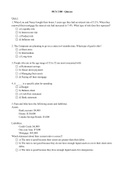Other
Personal Finance (MCS 2100) - Practice Quizzes
- Course
- MCS 2100 (MCS2100)
- Institution
- University Of Guelph (U Of G )
All of the multiple choice questions that arised during weekly quizzes in MCS 2100 - Personal Finance, taught at the University of Guelph. All typed notes.
[Show more]



